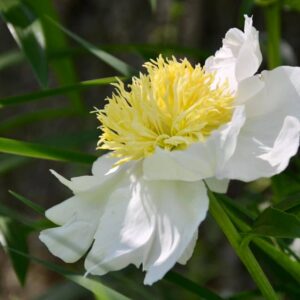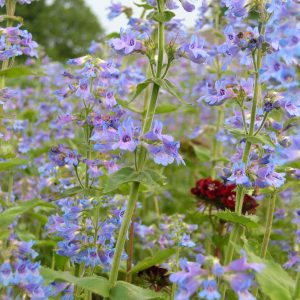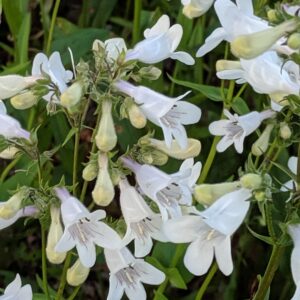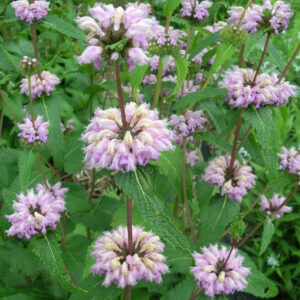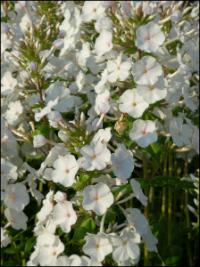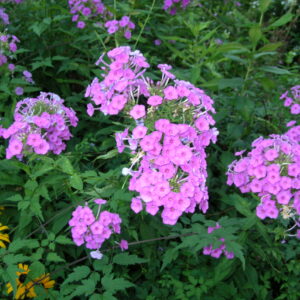Plants for Butterflies and Other Pollinators
Showing 129–136 of 211 results
-
Paeonia lactiflora x Jan Van Leeuwen Z 3-8
Fragrant cupped single white blooms with yellow stamens
OUT OF STOCK
Fragrant cupped single white blooms with yellow stamens
Size: 2' x 3'
Care: Full sun in moist well-drained soil. Deer and rabbit resistant
Native: Japan
Wildlife Value: birds and ants enjoy the sweet nectar on the buds before openingIntroduced in 1928
-
Penstemon ovatus Beardtongue Z 4-9
Cornflower blue trumpets encircle spike in June, one of our favorites.
OUT OF STOCK
Cornflower blue trumpets encircle spike in June, one of our favorites.
Size: 2’ x 8”
Care: Full sun in well-drained soil
Native: Pacific Northwest
Wildlife Value: attracts Baltimore butterfly, bees, bumblebees, flies, wasps and hummingbirds.Penstemon is named for its five stamens, penta meaning five in Greek. Penstemons. Ovatus means oval, shaped like an egg, with the narrower end up, referring to the foliage. This species first collected by Scottish plant hunter David Douglas (1799-1834) and introduced in 1826.
-
Penstemon tubaeflorus Great Plains Beardtongue 4-8
Spikes of swan white trumpets with flared ends blooms in early summer. One of most reliable, long lived penstemons.
Spikes of swan white trumpets with flared ends blooms in early summer. One of most reliable, long lived penstemons.
Size: 2-3’x 15”
Care: Sun in well-drained to moist well-drained soil
Native: Central Plains N., S. to TX & NE to Maine, Wisconsin native
Wildlife Value: feeds Baltimore butterfly, other butterflies, bees and hummingbirdsPenstemon is named for its five stamens, penta meaning five and stemon meaning stamen in Greek. Collected by English botanist Thomas Nuttall (1786-1859) who searched entire No. American continent – parts of Canada, from New England west to Oregon, parts of the South, Midwest, the Plains, the S.E., California & Hawaii, finding hundreds of new plants.
-
Philadelphus lewisii Lewis’ Mock Orange Z 4-9
A triple delight. From late spring to early summer clusters of 2” wide, four-petaled, snow-white flowers with a center boss of sunny stamens smother stem ends on this vase-shaped shrub. The flowers perfume the air with a delicious, orange scent. Then in fall the foliage turns citrus-yellow. Idaho adopted this as the state flower.
A triple delight. From late spring to early summer clusters of 2” wide, four-petaled, snow-white flowers with a center boss of sunny stamens smother stem ends on this vase-shaped shrub. The flowers perfume the air with a delicious, orange scent. Then in fall the foliage turns citrus-yellow. Idaho adopted this as the state flower.
Size: 5-10’ x 5-7’
Care: sun to part-shade in moist to well-drained soil
Native: from British Columbia to California, east to Montana.
Wildlife Value: Nectar and pollen attract bumble bees, moths, butterflies and hoverflies. It hosts caterpillars and chrysalises. Many birds eat the seeds.Natives used its strong and hard wood to make arrows, bows, combs, pipes for smoking, snowshoes, clubs, armor to protect chests, fishing spears, harpoon shafts, sticks for digging, knitting needles and baskets. Meriwether Lewis collected this plant on the Lewis & Clark Expedition in two places, in early May 1806 in Nez Perce County Idaho and two months later in Missoula County, Montana.
-
Phlomis tuberosa syn. Phlomoides tuberosa Jerusalem sage Z 5-8
Whorls of bubblegum pink, beak-shaped flowers encircle stem, ladder-like, in July. One of internationally known garden designer Piet Oudolf’s 100 “MUST HAVE” plants, Gardens Illustrated 94 (2013)
Whorls of bubblegum pink, beak-shaped flowers encircle stem, ladder-like, in July. One of internationally known garden designer Piet Oudolf’s 100 “MUST HAVE” plants, Gardens Illustrated 94 (2013)
Size: 4' x 12"
Care: Sun well-drained soil
Native: central and S.E. Europe to central Asia.
Wildlife Value: attracts butterflies, deer resistant.
Awards: Chicago Botanic Garden rates this 4-stars for health, robust growth, hardiness and flower production.In garden of English plant enthusiast Peter Collinson, 1736. The name Phlomis is Greek meaning “to burn” “because in old time the peasants used to burn these plants to enlighten their chambers.” Gardeners Dictionary, 1768. This species 1st collected in Siberia in 1759.
-
Phlox carolina ‘Miss Lingard’ Carolina phlox, Wedding phlox Z 5-8
True to its common name this 3’ tall selection bears bridal white blossoms with pink eyes late June into August with deadheading.
True to its common name this 3’ tall selection bears bridal white blossoms with pink eyes late June into August with deadheading.
Size: 3-4' x 18"
Care: sun to part shade in moist to moist well-drained soil. Powdery mildew resistant
Native: Cultivar of native in eastern and central U.S.
Wildlife Value: attracts butterflies and hummingbirdsPhlox is Greek meaning “flame.” The species carolina in gardens before 1889 and cultivar ‘Miss Lingard’ before 1905.
-
Phlox paniculata Garden phlox Z 4-8
Many small, tube-shaped flowers opening to five flat petals join together in a dome-shaped, fragrant, magenta 6-8” cluster at the end of each branch, blooming from July to September. The classic farm garden flower. Deadhead for rebloom.
Many small, tube-shaped flowers opening to five flat petals join together in a dome-shaped, fragrant, magenta 6-8” cluster at the end of each branch, blooming from July to September. The classic farm garden flower. Deadhead for rebloom.
Size: 4' x 2' spreader and self-seeder
Care: full sun to part shade in moist or moist well-drained soil.
Native: Pennsylvania west to Arkansas and Missouri. South to Alabama.
Wildlife Value: Silvery checkerspot, European cabbage, and Blue, Black & Spicebush swallowtails butterflies relish Phlox’s nectar. Deer and Walnut resistant.Phlox is Greek meaning flame. One of the 1st plants collected in No. America – grown in Tradescant the Elder’s South Lambeth (now a borough of South London) nursery in 1634. Offered for sale in Bartram Garden’s 1783 Broadside, America’s 1st plant catalog.
-
Pimpinella major ‘Rosea’ Greater burnet, Cow parsley Z 5-8
Like Queen Ann’s lace but fear its invasion? Here’s a look-alike, pink perennial that won’t take over. Its many upright stems, with lacy foliage, each support a pink umbel. Blooms in early to mid-summer.
Like Queen Ann’s lace but fear its invasion? Here’s a look-alike, pink perennial that won’t take over. Its many upright stems, with lacy foliage, each support a pink umbel. Blooms in early to mid-summer.
Size: 3’-4’ x 2’
Care: sun to part-shade in moist well-drained soil
Native: Europe and Caucasus
Wildlife Value: attracts bees and butterflies. Its flowers are rich in both pollen and nectar.First described in literature in 1812 by German botanist David Heinrich (1760-1846) in Nouvelle Flore des Environs de Paris. He named it Pimpinella rubra. Since then botanists decided it’s a cultivar of the white-flowered Pimpinellla major and renamed it.

